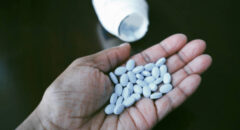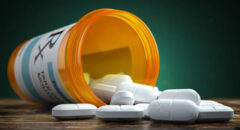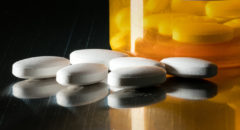 Yesterday morning, I was seeing patients with a colleague of mine, a physician and medical director of a large clinic providing medical care to residents of an impoverished section of Washington DC. Four patients came in being managed for hepatitis C infection and one of these patients was also HIV-infected. The good news is that the patients who had been treated for hep C infection had been cured with their medicines.
Yesterday morning, I was seeing patients with a colleague of mine, a physician and medical director of a large clinic providing medical care to residents of an impoverished section of Washington DC. Four patients came in being managed for hepatitis C infection and one of these patients was also HIV-infected. The good news is that the patients who had been treated for hep C infection had been cured with their medicines.
More good news is that the patient who also was HIV infected was controlled on her medications with no detectable virus in the blood. For all these patients, the major risk factor for their infections was injection drug use of heroin. Most of them were still struggling to control the addiction. In addition, another person came to the clinic in opioid-withdrawal seeking medical intervention.
So what are the options for treating opioid addiction? Are there medicines we can use, and if so, how do they work?
The main way that opioid addiction is managed with medication is through what we call substitution therapy. We are going to substitute the abused drug (e.g. heroin) for another opioid-related drug with a profile that may allow us to control the addiction and eventually stop the craving for the drug altogether. It’s similar to how we treat smoking, which is nicotine addiction, with nicotine replacement (an article coming up soon!).
Recall in the previous article I mentioned that heroin was a short-acting intravenous opioid, not that different from morphine. Injecting or snorting the drug produces an intense high but it only lasts a short time. After a few hours without the drug, the person starts feeling uncomfortable and needs more drug.
So the person spends their days alternating from being in a stupor due to depressive effects of the drug on one extreme to seeking more drug to relieve the discomfort of impending withdrawal. One way we approached this problem was to use an opioid with a much longer duration of action. The drug that came to the rescue; well, sort of; was methadone.
Most folks have heard of methadone and only think of its use in treating addiction, but methadone is a perfectly good analgesic with the benefit of providing longer ache relief. Very early in my career, some of my mentors advocated for the use of methadone in treating cancer soreness.
It provided better ache relief and resulted in less anxiety in these patients that were experiencing severe soreness. A person addicted to a drug like heroin or oxycodone who must seek out and use multiple doses a day to prevent withdrawal may be controlled on a single dose of methadone a day.
Because methadone persists at a steady concentration in the blood for a longer period of time, the thinking was that it might be possible to gradually taper a person off methadone without precipitating withdrawal and then eventually get them completely off the medication. Unfortunately, that seldom happens. Often, when we try to reduce the methadone dose, the patient does experience withdrawal, so many folks become “addicted” to methadone. But addiction to methadone is better than addiction to heroin. Because methadone is a prescription drug, its use is monitored by medical professionals.
As a prescription drug, the product is reliable and unlike street drugs which can differ in potency and purity. People using street drugs have no clue what they are actually getting. Also, a patient-controlled on methadone is less likely to have a craving to inject or snort street drugs so their risk for contracting HIV, hepatitis B, hepatitis C and other infections is reduced. People controlled on methadone can resume normal functions such as work and family responsibilities. But is methadone as good as it gets? Thankfully, NO!
Another treatment option is available for drug addiction is a drug called buprenorphine. Buprenorphine, like methadone, is also an analgesic. However, Buprenorphine has someunique features which provide an advantage in treating opioid addiction.
While it behaves like an opioid at the prescribed dosages, when taken at higher doses, it actually blocks the opioid effect. Along with some other features of the drug, this dual action of the drug seems to help people eventually get tapered off buprenorphine. This also makes it a safer drug because it is more difficult to overdose than with methadone or other opioids.
For a patient addicted to opioids, they must first stop taking it, whether it is heroin or some other opioid. When the signs and symptoms of withdrawal commence, buprenorphine tablets are administered under the tongue, allowing rapid absorption of the drug and relief from the withdrawal symptoms. The patient is stabilized on a daily dose of buprenorphine and then, a medical professional slowly reduces the dose over several weeks. In the end, the patient is no longer taking buprenorphine and no longer craving other opioids.
The person I mentioned at the beginning of the article who was in opioid withdrawal was coming in to hopefully get buprenorphine therapy. Buprenorphine can even be used in patients who are “addicted” to methadone.
I have seen many patients successfully curtail and end their opioid addiction with buprenorphine. But, as with all addictions, the ultimate success of the treatment depends on incorporating interventions that target the behavioral patterns that drive addiction and not just drugs that can manage the cravings.
For HIV patients who are injecting and snorting heroin or other opioids, controlling or stopping the addiction are paramount. An active drug user may not be adherent with taking their HIV and other meds. This can lead to the progression of HIV disease and decline of the immune system and also, the development of resistance to the HIV meds by the virus.
Controlling the addiction leads to better health outcomes across the board, especially with HIV and hepatitis. Work with your doctor and pharmacist to make sure there are no drug interactions between your HIV meds and methadone/buprenorphine or any other drugs you take.
One last drug I should mention is naloxone. Naloxone(Narcan) is referred to as an opioid antagonist. This means that if there are opioid drugs in your system, naloxone will block their effects. In a previous article, I mentioned how opioids can cause death through overdose by suppression of the nervous system and causing respiratory failure. Naloxone, if administered in time, can reverse an opioid overdose and save someone’s life.
The buprenorphine product includes naloxone in the tablet. This is intended to discourage someone from being treated for addiction from misusing the product to get high. When the tablet is administered properly under the tongue, no naloxone is absorbed; only buprenorphine.
All is well. If the patient tries to crush the tablet and inject the buprenorphine to get an intense high, then the naloxone is absorbed and the effect is blocked. The person would experience uncomfortable withdrawal symptoms.
In the next article, we will discuss stimulant drug abuse/addiction and the risk of HIV transmission and impact on the disease.
 Dr. Crawford has over 25 years of experience in the treatment of HIV. While at Howard University School of Medicine, he worked in two HIV-specialty clinics at Howard University Hospital. He then did clinical research as a visiting scientist with the AIDS Clinical Trials Group (ACTG) at Johns Hopkins University School of Medicine. He served as the Assistant Chief of Public Health Research with the Military HIV Research Program where he managed research studies under the President’s Emergency Plan for AID Relief (PEPFAR) in four African countries.
Dr. Crawford has over 25 years of experience in the treatment of HIV. While at Howard University School of Medicine, he worked in two HIV-specialty clinics at Howard University Hospital. He then did clinical research as a visiting scientist with the AIDS Clinical Trials Group (ACTG) at Johns Hopkins University School of Medicine. He served as the Assistant Chief of Public Health Research with the Military HIV Research Program where he managed research studies under the President’s Emergency Plan for AID Relief (PEPFAR) in four African countries.
He is currently working in the Division of AIDS in the National Institutes of Health. He has published research in the leading infectious diseases journals and serves on the Editorial Board of the journal AIDS. Any views and perspectives in his articles on blackdoctor.org are not representative of any agency or organization but a reflection of his personal views.








